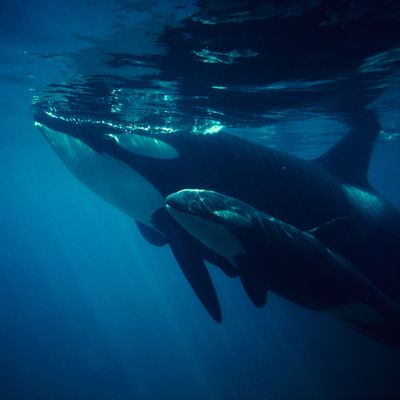
I am typing this article with one hand, while clenching the other in a fist and banging it furiously on my wooden desktop. I do not want to jinx the following announcement, which I make with the most cautious optimism: A “bouncing” orca baby has been born to a very unlucky group of killer whales in Puget Sound. Further, that orca baby has survived — the first to do so in approximately four years. Scientists have not declared the curse broken, but I am weeping nonetheless.
Since 2015, every calf born to the Southern Residents, as these whales are called, has died. Biologist David Ellifrit, of the Center for Whale Research, has thoughts about how that might feel.
“It’d be like living in a tiny little town where nobody knows why all the kids are dying,” Ellifrit mused to the New York Times. “Everybody knows each other, but they’re just dealing with this kind of premature death, over and over and over.”
Surely you will never forget the orca mom — Tahlequah, or J35 — who, in 2018, carried her dead calf on her nose for over two weeks to keep its lifeless body from sinking to the bottom of the sea. Tahlequah belongs to one of three pods (J, K, and L) that comprise the Southern Residents, and according to the Times, she’s “doing alright,” if “perhaps a little mopey.” Understandable, I think.
But no, this is a story of hope, and let’s get back to that. CWR biologist Melisa Pinnow spotted the Residents’ latest addition during the whale portion of Seattle’s news last Thursday: A small new friend “bebopping around” with the adults, she told the Times. The next day, Pinnow and her colleagues launched an expedition to locate the baby, naming it L124. They believe the calf to be about three weeks old, the offspring of whale L77. While the team doesn’t know Little L’s gender, they’re hoping for a girl. (Duh.)
The Southern Residents have seen many of their comrades fall in recent years, their population dropping from 100 in the late ’90s, to 75 in 2018. Scientists blame the shortage of Chinook salmon, deafening noise pollution from ship traffic, and chemical pollution that may weaken whale immune systems and interfere with fertility.
L124 seems to be lifting the elders’ spirits, bringing the three pods back together. Researchers noted that the whales seemed happier last Friday: They observed cartwheels, spy hops, breaches, tails slaps, even pec slaps. “This party was a little dull — nothing like the more playful, interactive gatherings these orcas used to have decades ago,” the Times noted. Cut them some slack, they’ve been through a lot.
Speaking to the Seattle Times, the CWR’s founding director, Ken Balcolmb, described the birth as “great news,” but advised us to keep our hopes down: Survival rates at this stage hover around 50 percent, and this is a lot of pressure to heap on one animal. So, please, knock on wood, and telegraph good thoughts to Seattle. Hang in there, buddy!





